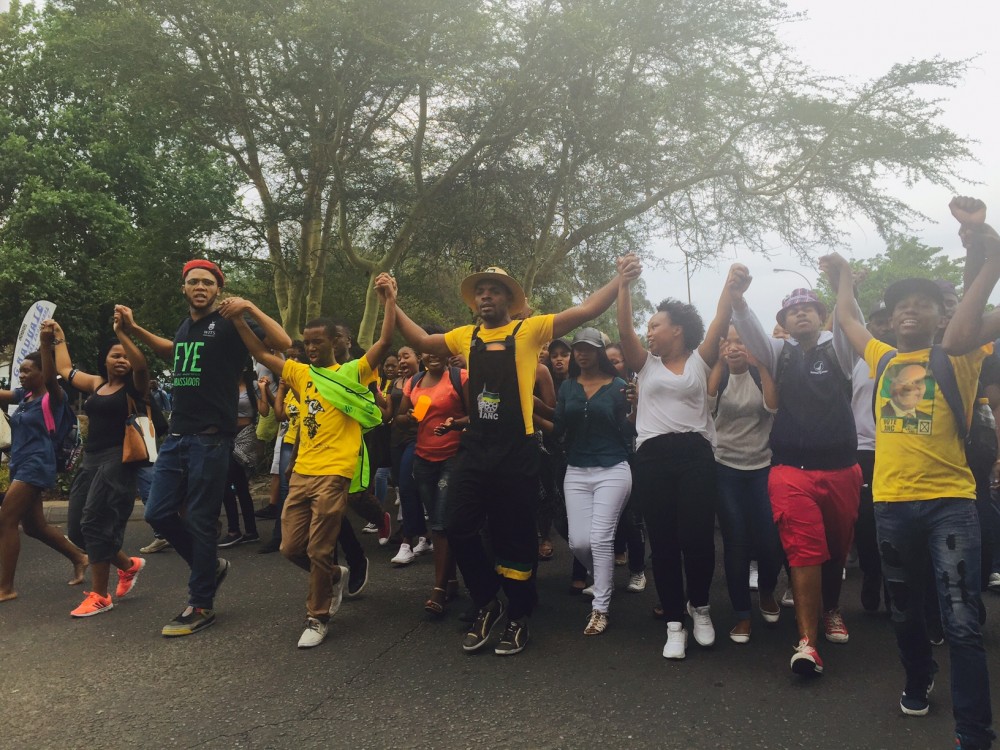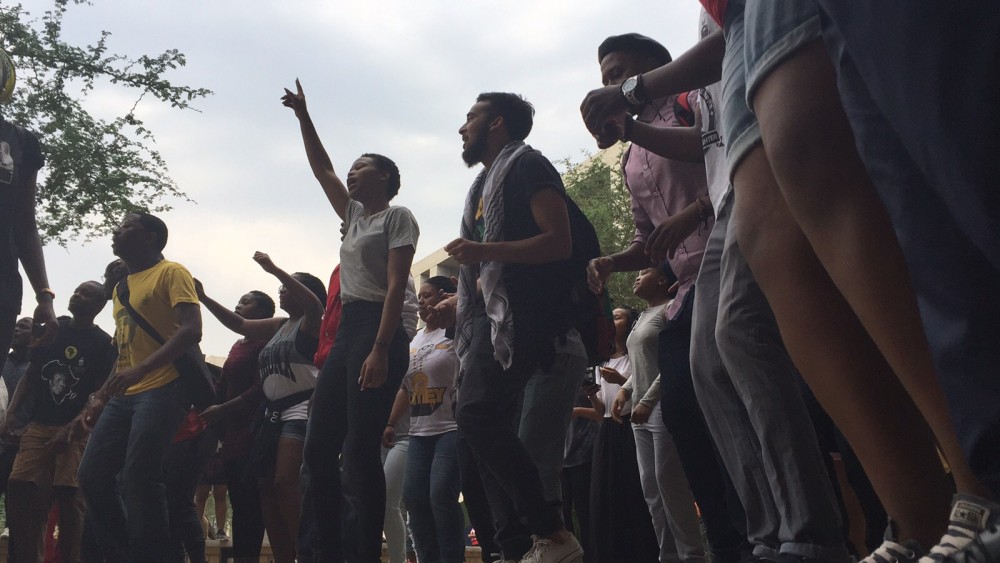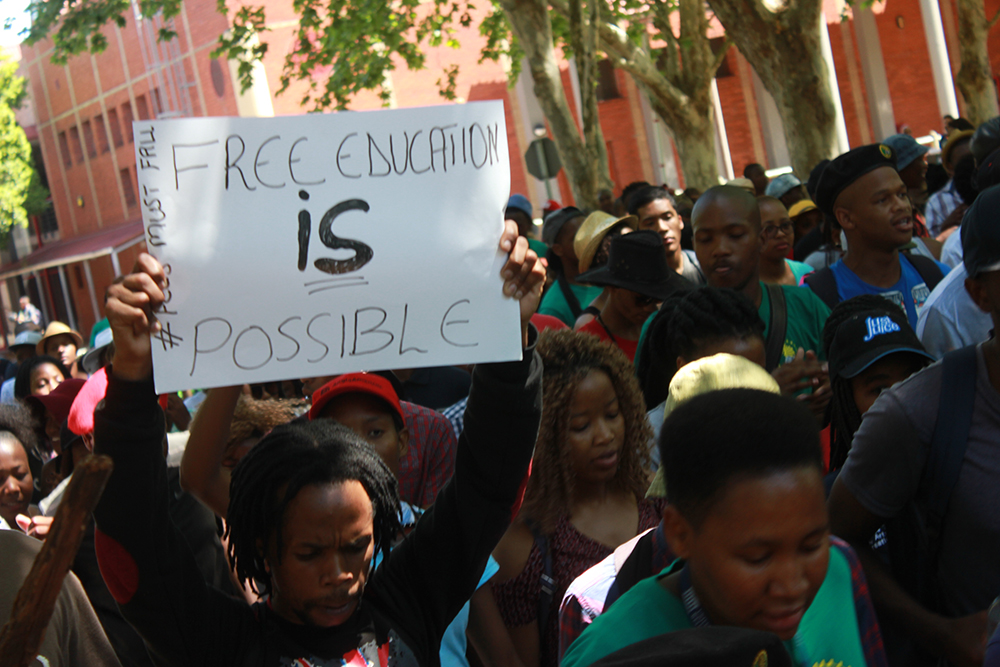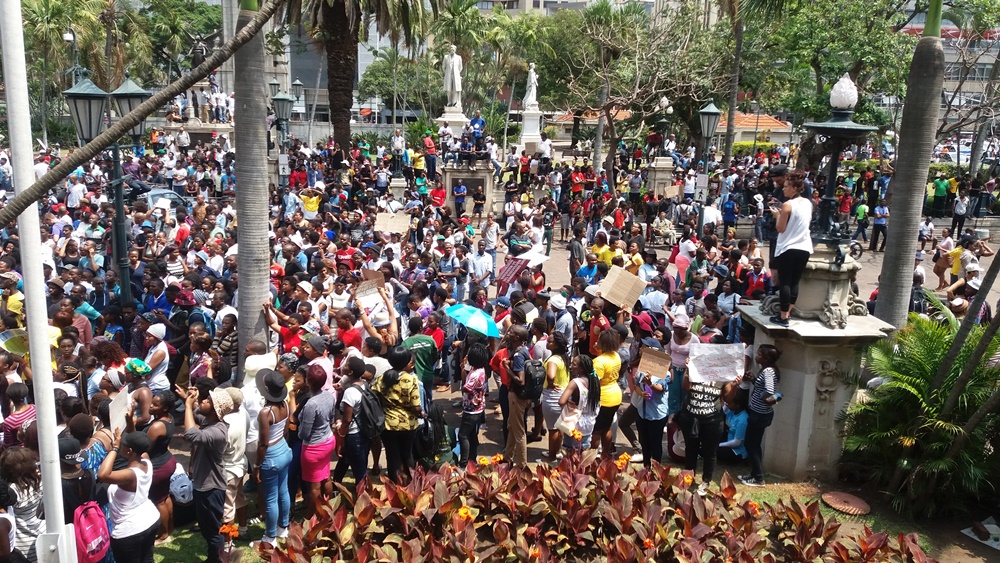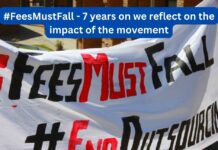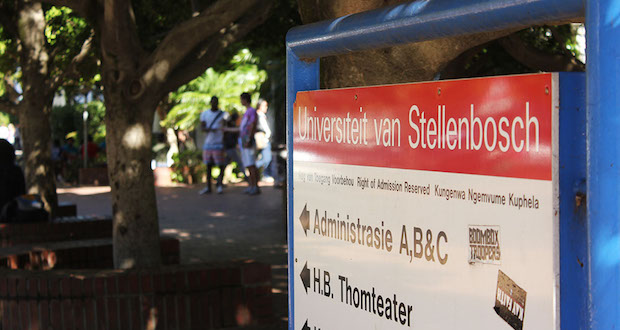In some quarters, the recent #FeesMustFall protests have been all consuming. And in others, the silence has been deafening. ISHAY GOVENDER-YPMA explains why she sees the protests as a watershed moment for the country and questions why her colleagues in tourism have been so skeptical of taking a stand on them.
Last week, I was fuming. Fizzling, sparking like a dislodged pylon in a thunderstorm, snaking haphazardly on the ground with firecracker bolts of electricity. That angry. When I checked in with myself in a quiet moment after a week-and-a-half of chaos, having swallowed the worst of the misdirected vitriol, misunderstanding and the accompanying lack of empathy that seemed to coat (a part of) the nation, I realised I was more disappointed than angry. And I have been for a while. With South Africans. And white South Africans, in particular. Why? I’ll pick or else it will be a long day for all of us.
Let’s examine the inherited power and privilege (which can not be argued) which could be used to facilitate conversations and change, particularly at a watershed moment like the #FeesMustFall protests the past week. And as it happens, whites comprise the majority of the faces, voices and eager hands in one of the media fields I work in – travel writing.
Incidentally, I made a call a year or so ago on the African Travel Bloggers and Writers page asking where the black travel writers are, and what is being done to encourage, support, mentor, boost and uplift same. You do know the answer, I bet. ((Snooze)).
Should this be something we even need to address, I imagine the synapse-firing from my comrades. Shall we look at the word “transformationâ€, being my counter. Here’s a 2014 declaration that Tourism Minister Hanekom is addressing transformation.
White travel writers have a duty, as much as any to check in their privilege and to ensure our country is being represented in a manner that is conducive to ensuring equality. What goes this mean? Grab less for yourself, and share the narrative to enable a broader telling, to a wider audience of black people. These are not conflated issues. They stem from the same place, though one cannot argue that the fight for accessible tertiary education is a more urgent, noble and immediate one.
A colleague (white) wrote the following to me via DM:
Off the top of my head I would say travel has been silent on #feesmustfall because of its own investment in white privilege – so much travel writing is predicated on exclusion and othering. I say this to you to say it to someone…
When Mbeki asks where the young black science graduates are, I feel obligated to piggy-back on his logic and ask the same about travel writers and travel voices too. And for anyone holding onto the pipedream of our beloved “Rainbow Nationâ€, I addressed it as such in one of my Facebook posts:
“We didn’t have a quiet, peaceful, perfect “Rainbow Nation†before. We had a nation asleep. It’s awakening. You didn’t expect it not to, did you?†I think that made a number uncomfortable. And that’s perfectly fine, I’ve realised. You need to be uncomfortable.
My request to Tourism in SA:
“I haven’t seen a single tourism board, representative/authority/highly invested party comment meaningfully, intelligently or with any form of commitment to the #FeesMustFall protests on SM. I haven’t searched with a toothcomb, so if I’m wrong, please do share the tweets/posts. These students are our future, and surely tourists deserve to know about current history unfolding, as much, if not more than the bit about the fort, the Company Gardens, Jan van R and co, and Robben Island. Everyone knows South Africa is worth so much more than the beaches, wine farms and expensive accommodation we try to sell. Here’s a people’s story worth telling now, no additional hash tag needed. I’m embarrassed at the lack of commitment to the cause for better, more accessible education, that, from the students’ perspective is not political at this stage. Why the hesitation?â€
The Specifics
More than Just Fees As many articles have since covered, #FeesMustFall represents issues far larger and more deep-seated than the escalating cost of tertiary education. Here’s one.
Eusebius McKaiser usually gets it right, and he does here too in a piece for the New York Times about the fall of the statues and then the call for fees to be slashed:
“But they miss the point. The core issue is a prevalent feeling, and experience, of exclusion among many black students in universities across the country, even where they are a numerical majority.”
I think you can rightfully extrapolate this without much fiddling to represent what is happening in the world of travel media and tourism in South Africa too. Black voices are a minority here, and token in some cases, in a country where they form a majority. A majority who does not, and if things are left as is, will never on the whole, have an opportunity to experience and travel through South Africa. This is a world where PR events and media launches remain lilly-white, and “cool†blacks are pounced upon to include in “Rainbow Nation†social media images.
Where is South African travel in all of this?
In light of the unfolding living history we experienced, particularly with two young, black female student leaders standing up – against the pale face of patriarchy (Yes, pretty, smart: they made for enviable “Life†magazine front covers), I was shocked to hear no word from the bosses.
None from South African Tourism, none from Cape Town Tourism, none from Minister Hanekom whom I tweeted (and who was, in fairness to him, engaging on the broader issue at least). No squeak from independent marketing agencies, independent travel PRs etc either. These are, for the vast majority white-owned, catering to white-owned businesses and in the end, a white travel audience – readers, holiday-makers, even “fantasy†travellers. And more telling, none from the white writers - friends and colleagues - who being roughly the same age as me, must understand acutely the power of their own voices at a time like this.
Instead, I heard the deafening echo of silence, of participation in omission, of the strategic wait-it-out. I heard, I saw, we witnessed a wash-out of bold cowardice. Surely, I argued, this living history – a protest in the name of education and the multitude of inequalities we, the black people of his country have just come to drape on like threadbare winter coats, a very long time coming too, will be what we speak about years from now, in much the same way we do with pride about 1976? You know, it makes the history books, then guides swallow up the facts, then we include it in our write-ups and prance it proudly as part of our history.
Oh, not 1976 again, one white Facebook colleague on my TL stated, and with that, I knew the lines had been drawn. A friend who works with South African Tourism briefed me that the as the protests got violent, the organisation’s protocol would be to say nothing. I understood her precarious position, even engaging with the issue, as part of her civic duty. I saw many individuals, as independent as I am - freelancers, bloggers etc – choose to digest #FeesMustFall and say nothing, coming out a week later to report on support needed for an environmental crisis elsewhere.
For anyone curious, because this is a topic that my friends and I have discussed a bit over the protests and the past two years: Why humans care more about pets than other humans.
You can thin this out to cover the earth, and humans not living in close proximity too I find, but I’ll take all the empathy (and hopefully tangible support too) for Syrian refugees over the stone-cold silence of the past week, any day.
Know their Names
My 15-year-old nephew from The Netherlands was visiting with us, his first trip to Cape Town during the week of the protests, and it was our duty to him and in keeping with an honest telling of our South African story to keep him up-to-date about the protests, what they mean, where we are as far as transformation goes and how far we are yet to go. He left the city with far more than knowledge of Jan van Rieebeck, Table Mountain, our glorious bounty of food and Nelson Mandela’s sacrifices. He learned the names Shaeera Kalla and Nompendulo Mkhatshwa too.
Much love for my Queens @shaeera_k and @Ulo_Mkat ?✊⤠pic.twitter.com/JsEoX8KyjS
— Bye! (@TheBlackElton) October 24, 2015
Share your voice
In light of all of the above, I made a call to the African Travel Bloggers & Writers Network Facebook page (and later opened it) to invite engagement on the issues, and even broke down how anyone - local, foreign, people of colour and not - could get involved by sharing just 50 words of their own experiences, with the aim of calling for the tourism bodies and authorities to answer for their lack of interest and commitment. From that call, three black voices (one not belonging to the group) and two white voices – foreign writers living in South Africa responded. You can read all at the end of the post.
“I felt slightly uncomfortable about how comfortable I was made to feel at UCT, despite being a foreigner, while conversations with students of colour (South African and otherwise) suggested that their experience was generally very different, even though they’d often had to go through a lot more to get there than I had.†– journalist Christopher Clark
“When it comes to #FeesMustFall we all need to speak up. It is not only about human rights, dignity and equality. It is about what future we want to live in. Because we will all suffer the consequences of not making education a priority, regardless of whether we are from Sandton, Soweto or Sweden.†Katarina Mancama – guide, blogger, Fair Trade consultant
“In the malls I was called a ‘coolie’. The word screamed at my back as I walked past in my Mr Price jeans with backpack full of newly bought textbooks. Books I could never afford without the bursary without getting into ridiculous amounts of debt.†– Mahen Govender, software developer
“My parents weren’t in a position to stand surety for me and education policies were a foreign concept on the Cape Flats. My matric marks reflected my lack of study skills, access to a computer at home and lack of funds for extra lessons. Maybe if I had access to the same support available to my more affluent classmates.†– Tami Magnin, blogger, social development coordinator
Educate yourself
I have over the past week and half attended to queries (by white friends and colleagues) who asked for an explanation of the issues, who expressed that their reluctance to get involved was based in not understanding the issues, not wanting to get politically involved and not condoning any pursuant violence, that in a few cases, erupted on a minor level.
In addition to my explanations, you can read this news report from the Washington Post, this column by Zama Ndlovu in the Business Day, this op-ed by Richard Pithouse in the Daily Maverick, this opinion from Max Du Preez on News24 and this perspective from constitutional law expert and UCT lecturer Pierre De Vos on why excluding students because of a lack of funds may be unconstitutional.
Silence and complicity
Many have chosen to keep quiet, piping up now and then when liberal media, half-way through the protests, started to broadcast the aggression of police towards students and a smattering of young white hands and white faces joined in. Now, there was something that could be understood. The insults levelled at “barbaric†black students, were swallowed and instead the words “braveâ€, “solidarity†and “rainbow nation†were flung about. This is what many white people in our country love to hear - promises of colourful things where order is restored and we all just “get along†like before.
The students in our country were asking us to listen, yet again, and instead we served them with hesitation from the shackles of our safe suburban lives and jobs. Some attacked them with the slingshot of disgust. (“Monkeys!â€) One even told me that we deserved this for not having voted the “right†party in, and then promptly deleted all posts made on my TL where his crude arguments were met with patience, reason and an opportunity to reassess. And so, I ask again - do we make you uncomfortable? Perhaps we need to. So that you can have the courage to use your voice, to tell our stories, with us.
Stories on why #FeesMustFall
Suntosh Pillay, 30, clinical psychologist
Nelson Mandela challenged us to deal with poverty and inequality by recognising that “the world is hungry for action, not words. Act with courage and vision. Sometimes it falls on a generation to be great. You can be that great generationâ€
Our current student protests embody a generation taking charge of its destiny, impatient with the empty promises of post-1994 political rhetoric. We are (finally) living through a time marked by the theme of radical dissent. And it has been worth the wait. There was no gold at the end of the rainbow (nation). Only a cruel and laughing leprechaun named Privilege. Post-1994 discourses have created versions of reality divorced from people’s lived experiences. For example, the narrative of hard work – “Just work hard, try hard, keep at it, have faith, maybe next time†– conceals an oppressive system that severely limits the possibilities for poor black students.
The organic rise of these social movements, interdependent and, perhaps, ancestrally infused with Biko’s quest towards a true humanity, have provided for each other an emotionally cathartic and safe space to express itself and become itself.
Christopher Clark, journalist
I don’t think I’d ever really thought that much about or fully acknowledged my “white privilege†until I first came to South Africa from rural England in 2008 and, more, when I came back to study at UCT in 2010.
Many things about UCT instantly struck me as strange. Why were so many of the buildings still named after racist English colonialists? Why did white people (young white men in particular) tend to dominate class debates? And why the hell were we learning Shakespeare?
I felt slightly uncomfortable about how comfortable I was made to feel at UCT, despite being a foreigner, while conversations with students of colour (South African and otherwise) suggested that their experience was generally very different, even though they’d often had to go through a lot more to get there than I had.
In the years since I left, both through my work as a journalist and as a result of falling in love with with a young black South African woman, I have become acutely aware of how easy my ride through life thus far has been because of my British passport, my sex and my skin colour. I’ve also become acutely aware of the necessity of equal access to education to level the playing field somewhat.
Due in large part to my own education and the ability of my family to pay for most of it, I now have a job that I love dearly, and which I live comfortably from. I believe that everyone in a similar position has a responsibility to use it. Personally, I will happily do everything and anything I can to support #FeesMustFall. I’ve come to see that my efforts are a very small price to pay for my privilege.
Katarina Mancama, blogger and Fair Trade consultant
If there is one thing I have learned during my 10 years living in South Africa, it is that I don’t know anything at all. At least not about what it is like to grow up in a system that considered skin colour to be the indicator of a human’s value. I grew up in one of the most equal, fair and democratic countries in the world. Although being a foreigner in South Africa comes with its own set of struggles (you, know Home Affairs and such like), I know nothing of struggling to put food on the table or keeping warm at night. I am acutely aware of the fact that I live a very privileged life, and sometimes I feel guilty about it. I also feel that I have little right to comment on struggles, movements and protests here even though I at times fail to understand what good they will bring.
Most protests have a for and against argument. Usually something’s gotta give when one side wants more. But in education, there are no losers. Everyone wins. Individuals, families, communities and society as a whole benefit from higher levels of education. Yes, it costs money but that money will be returned through higher productivity, less dependency on welfare and more taxes paid. When it comes to #FeesMustFall we all need to speak up. It is not only about human rights, dignity and equality. It is about what future we want to live in. Because we will all suffer the consequences of not making education a priority, regardless of whether we are from Sandton, Soweto or Sweden.
Tami Magnin, social development coordinator
Not everyone had the same childhood you had. Some kids are expected to grow up too soon and school is just one of their many responsibilities. Don’t they deserve a fair chance to crawl out of their circumstances and make a better life for themselves and their families?
Almost 20 years ago, I trudged the streets, looking for the part time job that banks required of their student loan applicants, but came up empty. My dreams of a degree in Journalism had to be set aside for a 2 year diploma that would enable me to support myself as quickly as possible.
My parents weren’t in a position to stand surety for me and education policies were a foreign concept on the Cape Flats. My matric marks reflected my lack of study skills, access to a computer at home and lack of funds for extra lessons. Maybe if I had access to the same support available to my more affluent classmates.
If government stopped bailing out parastatals, we could give bursaries to people who show potential, not to kids with means who then take their qualifications overseas.
The #FeesMustFall protesters show us what future South Africa could look like. Awesome!â€
Mahen Govender, 33, technology consultant
Growing up, I remember driving past the plush schools in the white areas thinking ‘goodness that grass is green’. It always surprised me how much Space they had..and how big and beautiful and important the buildings looked.
The feeling this planted in your mind was that white was superior. In all things. And there was nothing you could do about it.
When I was old enough to understand it academics became my weapon against the bitterness I felt. If they didn’t feel I was good enough I would “show themâ€. I was awarded a bursary and studied in the Free State. And I did show them, repeatedly. But the feeling of inferiority stayed.
In the malls I was called a ‘coolie’. The word screamed at my back as I walked past in my Mr Price jeans with backpack full of newly bought textbooks. Books I could never afford without the bursary without getting into ridiculous amounts of debt. And so the feeling of inferiority remained.
Three years later I started working, for the same company that funded my studies. All my managers were white males. Calling them by their first names was the hardest adjustment i had to make in that new stage of my life. The word Uncle and Sir being very difficult to hold in.
Education has allowed me the possibility to play on a field with white people and compete on a relatively even footing. It has even helped to make me feel almost as worthy. It might not be enough, but its a starting point.
The fees have risen to a point that average middle income households can no longer afford tertiary education without incurring heavy debt. Education is the key to solving the inequality in our country, and it needs to be accessible to all who would like to pursue it.
This article was originally published on the Food and the Fabulous blog.

![UWC_FMF_RP_4 [slider]](https://www.thedailyvox.co.za/wp-content/uploads/2015/10/UWC_FMF_RP_4-slider.jpg)
